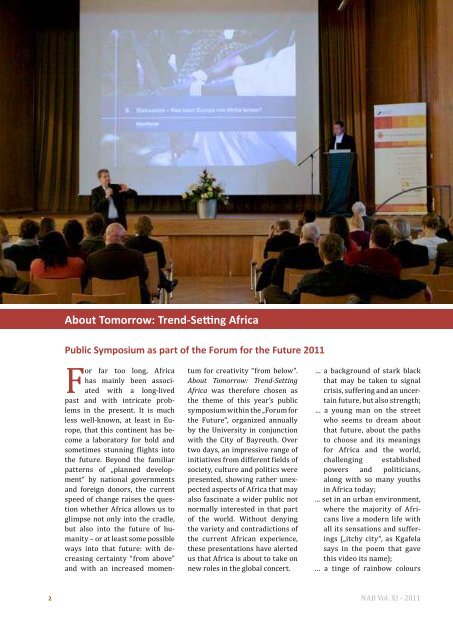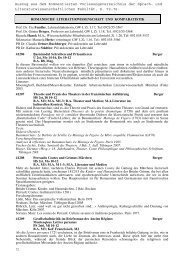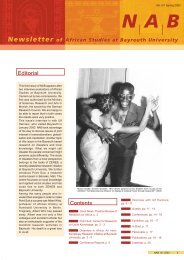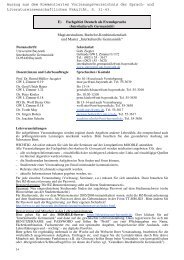NAB VII - ias.uni-bayreuth.de
NAB VII - ias.uni-bayreuth.de
NAB VII - ias.uni-bayreuth.de
Create successful ePaper yourself
Turn your PDF publications into a flip-book with our unique Google optimized e-Paper software.
2<br />
About Tomorrow: Trend-Setting Africa<br />
Public Symposium as part of the Forum for the Future 2011<br />
For far too long, Africa<br />
has mainly been associated<br />
with a long-lived<br />
past and with intricate problems<br />
in the present. It is much<br />
less well-known, at least in Europe,<br />
that this continent has become<br />
a laboratory for bold and<br />
sometimes stunning flights into<br />
the future. Beyond the familiar<br />
patterns of „planned <strong>de</strong>velopment“<br />
by national governments<br />
and foreign donors, the current<br />
speed of change raises the question<br />
whether Africa allows us to<br />
glimpse not only into the cradle,<br />
but also into the future of humanity<br />
– or at least some possible<br />
ways into that future: with <strong>de</strong>creasing<br />
certainty “from above”<br />
and with an increased momen-<br />
tum for creativity “from below”.<br />
About Tomorrow: Trend-Setting<br />
Africa was therefore chosen as<br />
the theme of this year’s public<br />
symposium within the „Forum for<br />
the Future“, organized annually<br />
by the University in conjunction<br />
with the City of Bayreuth. Over<br />
two days, an impressive range of<br />
initiatives from different fields of<br />
society, culture and politics were<br />
presented, showing rather unexpected<br />
aspects of Africa that may<br />
also fascinate a wi<strong>de</strong>r public not<br />
normally interested in that part<br />
of the world. Without <strong>de</strong>nying<br />
the variety and contradictions of<br />
the current African experience,<br />
these presentations have alerted<br />
us that Africa is about to take on<br />
new roles in the global concert.<br />
… a background of stark black<br />
that may be taken to signal<br />
crisis, suffering and an uncertain<br />
future, but also strength;<br />
… a young man on the street<br />
who seems to dream about<br />
that future, about the paths<br />
to choose and its meanings<br />
for Africa and the world,<br />
challenging established<br />
powers and politicians,<br />
along with so many youths<br />
in Africa today;<br />
... set in an urban environment,<br />
where the majority of Africans<br />
live a mo<strong>de</strong>rn life with<br />
all its sensations and sufferings<br />
(„itchy city“, as Kgafela<br />
says in the poem that gave<br />
this vi<strong>de</strong>o its name);<br />
... a tinge of rainbow colours<br />
<strong>NAB</strong> Vol. XI - 2011 <strong>NAB</strong> Vol. XI - 2011<br />
Discussion in the plenary about experiences with<br />
micro-credit systems in Africa. (Thierl)<br />
(red, yellow and green), old<br />
symbol of Panafrican connectedness<br />
across the continent<br />
and the globe;<br />
... a broadcasting tower, unmistakeable<br />
indicator of the<br />
importance of new media in<br />
popular mobilisation (tv, mobiles,<br />
electronic networks...);<br />
... and the mo<strong>de</strong>rn adaptation of<br />
long-standing arts of orality<br />
in Africa, as represented by<br />
Kgafela’s „Slam Poetry“ that<br />
is recor<strong>de</strong>d in this vi<strong>de</strong>o.<br />
Following such lines of<br />
thought, the Symposium was<br />
successfully proposed, convened<br />
and organised by the Institute<br />
for African Studies (IAS) – the<br />
hub of African Studies at the<br />
University of Bayreuth which<br />
inclu<strong>de</strong>s, among others, the renowned<br />
Bayreuth International<br />
Graduate School for African Studies<br />
(BIGSAS). The Symposium<br />
was part of the increasing presence<br />
of Bayreuth African Studies<br />
amongst the wi<strong>de</strong>r public, well<br />
beyond aca<strong>de</strong>mia (see other reports<br />
in this issue). Besi<strong>de</strong>s the<br />
Symposium, as in every year,<br />
the „Forum of the Future“ also<br />
encompassed the award of the<br />
“Wilhelmine of Bayreuth Prize<br />
for Tolerance and Humanity in<br />
Cultural Diversity” by the City of<br />
Bayreuth. This year, in tune with<br />
the Symposium theme, it went to<br />
Madjiguène Cissé, a Senegalese<br />
human rights and women’s <strong>de</strong>velopment<br />
activist.<br />
The first part of the event took<br />
Forum for the Future<br />
Mark Kaigwa explains the potential of digital<br />
comm<strong>uni</strong>cation in Africa. (Thierl)<br />
place in the Auditorium Maximum<br />
(AudiMax) of the University.<br />
Opening addresses were<br />
given by its Vice-Presi<strong>de</strong>nt Prof.<br />
Stefan Leible, by the Mayor of<br />
Bayreuth, Dr. Michael Hohl, and<br />
by the Director of the IAS, Prof.<br />
Achim von Oppen. Prince Kum’a<br />
Ndumbe III, <strong>uni</strong>versity professor<br />
and prolific writer from Douala,<br />
Cameroon, then <strong>de</strong>livered an impressive<br />
opening lecture. In immaculate<br />
German, he explained<br />
why „Africa is the Future“ and<br />
plea<strong>de</strong>d for a more peaceful and<br />
sustainable way forward, to<br />
which an encounter with Africa<br />
at eye level can contribute a lot<br />
(see translated extracts adjacent<br />
to this overview).<br />
Maintaining or making peace<br />
3






